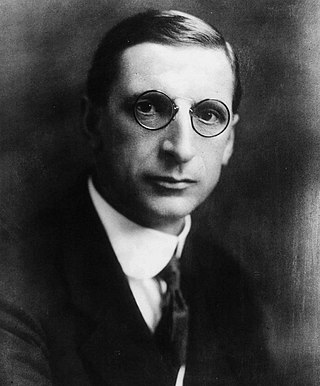
The 1918 Irish general election was the part of the 1918 United Kingdom general election which took place in Ireland. It is a key moment in modern Irish history because it saw the overwhelming defeat of the moderate nationalist Irish Parliamentary Party (IPP), which had dominated the Irish political landscape since the 1880s, and a landslide victory for the radical Sinn Féin party. Sinn Féin had never previously stood in a general election, but had won six seats in by-elections in 1917–18. The party had vowed in its manifesto to establish an independent Irish Republic. In Ulster, however, the Unionist Party was the most successful party.

Mid Ulster is a parliamentary constituency in the UK House of Commons. The current MP is Francie Molloy of Sinn Féin.
The Northern Ireland Labour Party (NILP) was a political party in Northern Ireland which operated from 1924 until 1987.
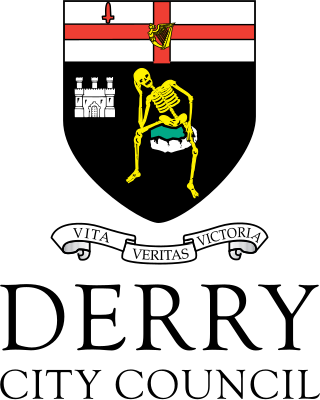
Derry City Council was the local government authority for the city of Derry in Northern Ireland. It merged with Strabane District Council in April 2015 under local government reorganisation to become Derry and Strabane District Council.
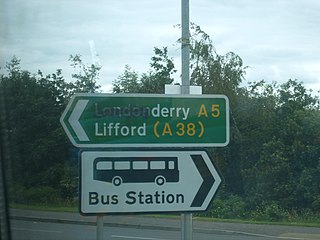
The names of the city and county of Derry or Londonderry in Northern Ireland are the subject of a naming dispute between Irish nationalists and unionists. Generally, although not always, nationalists favour using the name Derry, and unionists Londonderry. Legally, the city and county are called "Londonderry", while the local government district containing the city is called "Derry City and Strabane". The naming debate became particularly politicised at the outset of the Troubles, with the mention of either name acting as a shibboleth used to associate the speaker with one of Northern Ireland's two main communities. The district of Derry and Strabane was created in 2015, subsuming a district created in 1973 with the name "Londonderry", which changed to "Derry" in 1984.

Free Derry was a self-declared autonomous Irish nationalist area of Derry, Northern Ireland that existed between 1969 and 1972 during the Troubles. It emerged during the Northern Ireland civil rights movement, which sought to end discrimination against the Irish Catholic/nationalist minority by the Protestant/unionist government. The civil rights movement highlighted the sectarianism and police brutality of the overwhelmingly Protestant police force, the Royal Ulster Constabulary (RUC).

The Battle of the Bogside was a large three-day riot that took place from 12 to 14 August 1969 in Derry, Northern Ireland. Thousands of Catholic/Irish nationalist residents of the Bogside district, organised under the Derry Citizens' Defence Association, clashed with the Royal Ulster Constabulary (RUC) and loyalists. It sparked widespread violence elsewhere in Northern Ireland, led to the deployment of British troops, and is often seen as the beginning of the thirty-year conflict known as the Troubles.
The Northern Ireland Civil Rights Association (NICRA) (Irish: Cumann Cearta Sibhialta Thuaisceart Éireann) was an organisation that campaigned for civil rights in Northern Ireland during the late 1960s and early 1970s. Formed in Belfast on 9 April 1967, the civil rights campaign attempted to achieve reform by publicising, documenting, and lobbying for an end to discrimination against Catholics in areas such as elections (which were subject to gerrymandering and property requirements), discrimination in employment, in public housing and abuses of the Special Powers Act.
Ivan Averill Cooper was a nationalist politician from Northern Ireland. He was a member of the Parliament of Northern Ireland and a founding member of the Social Democratic and Labour Party (SDLP). He is best known for leading the civil rights march on 30 January 1972 that developed into the Bloody Sunday massacre.
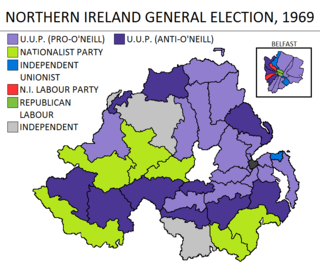
The 1969 Northern Ireland general election was held on Monday 24 February 1969. It was the last election to the Parliament of Northern Ireland before its abolition by the Northern Ireland Constitution Act 1973.

The City of Londonderry parliamentary constituency was a single member constituency in the Parliament of Northern Ireland. It was created in 1929, as one of the five single member constituencies replacing the former five member Londonderry constituency.
Jack Allen is a former politician in Northern Ireland. Working as a businessman, Allen became a member of the Ulster Unionist Party (UUP). He was elected to Londonderry City Council. In 1974-75, he served as Mayor of Derry.
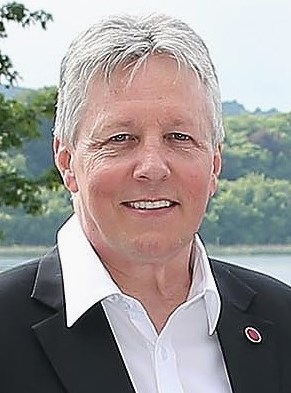
The 2011 Northern Ireland Assembly election took place on Thursday, 5 May, following the dissolution of the Northern Ireland Assembly at midnight on 24 March 2011. It was the fourth election to take place since the devolved assembly was established in 1998.

The 2016 Northern Ireland Assembly election was held on Thursday, 5 May 2016. It was the fifth election to take place since the devolved assembly was established in 1998. 1,281,595 individuals were registered to vote in the election. Turnout in the 2016 Assembly election was 703,744 (54.9%), a decline of less than one percentage point from the previous Assembly Election in 2011, but down 15 percentage points from the first election to the Assembly held in 1998.

An election to Londonderry Borough Council took place on Thursday 15 January 1920 as part of that year's Irish local elections.
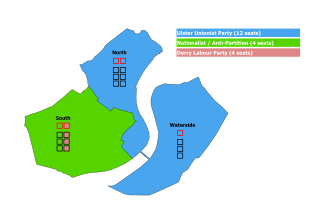
Elections to Londonderry Borough Council were held on 16 October 1946. The Ulster Unionist Party (UUP) retained their majority with Sir Basil McFarland continuing as Mayor of Londonderry. The elections were postponed from the original February date due to an unusually large number of objections to the list of electors.
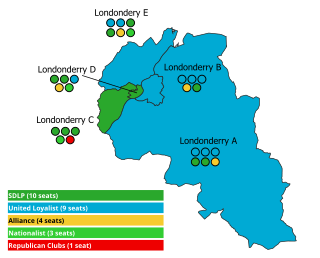
The 1973 Londonderry City Council election took place on 30 May 1973 to elect members of Londonderry City Council in Northern Ireland. This was on the same day as other Northern Irish local elections. The campaign was significant in that, following changes to the election process and districts, Irish nationalist parties were able to take control of the council for the first time.
Elections to Londonderry Borough Council were held in 1964. Albert Anderson continued as Mayor.

Local elections were held in Northern Ireland on 18 May 2023. The elections were delayed by two weeks to avoid overlapping with the coronation of King Charles III. Following the elections, Sinn Féin became the largest party in local government for the first time. It also marked the first time that nationalist parties had garnered a greater share of the vote than unionist parties.














